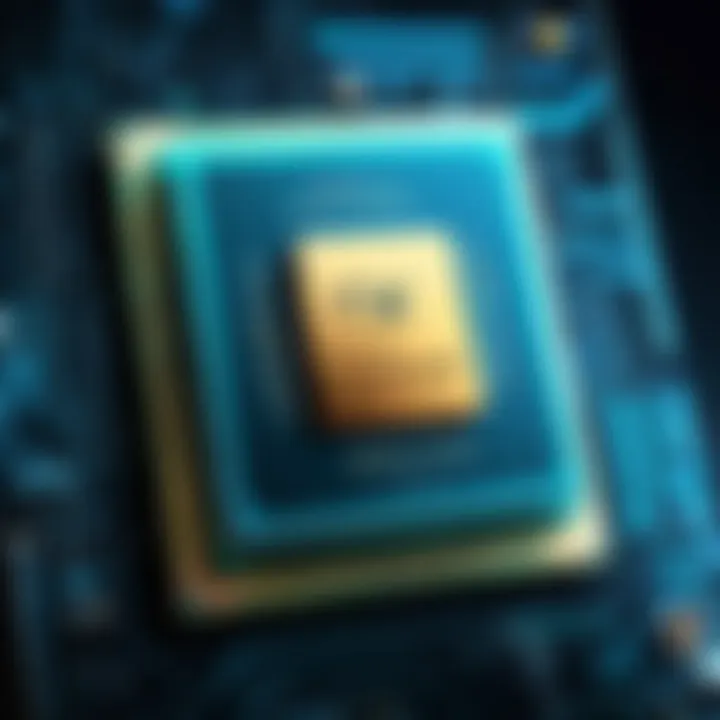Top Gaming CPUs of 2022: Performance Analysis


Intro
In 2022, the gaming landscape is more competitive than ever, with both casual players and professionals seeking the best possible experience. Critical to achieving this are the central processing units (CPUs) that power gaming rigs. This article provides a detailed analysis of the top gaming CPUs available this year, examining the essential performance metrics, usability, and user experience. By delving into specifications, benchmark results, and industry trends, we aim to equip both IT professionals and gaming enthusiasts with the insights necessary for making informed purchasing decisions.
Performance Metrics
Performance metrics are paramount when evaluating gaming CPUs. They dictate how smoothly and efficiently a system operates under load. Several factors influence these metrics, including clock speed, core counts, and overall architecture. The two major players in the CPU market, AMD and Intel, continually innovate to provide improved performance.
Benchmarking Results
Benchmarking is crucial for determining how a CPU will perform in real-world scenarios. Various softwares, such as Cinebench and 3DMark, allow users to assess processing power in a standardized manner. In 2022, notable contenders include the AMD Ryzen 9 5900X and the Intel Core i9-12900K. Benchmarks have shown that AMD's Ryzen 9 series excels in multi-threaded performance, making it ideal for multitasking and content creation. Intel's Core i9 provides high single-threaded performance, which benefits most current games.
These differences illuminate the strengths of each architecture.
Speed and Responsiveness
Aside from raw performance as highlighted by benchmarks, speed and responsiveness are essential in the gaming CPU context. Users expect minimal lag, swift frame rates, and quick loading times. CPUs with higher clock speeds typically deliver better performance. For example, the Intel Core i7-12700K operates at 5.0 GHz, offering impressive responsiveness in gaming. When choosing a CPU, looking into both clock speed and architecture efficiency is crucial for an optimal experience.
Usability and User Experience
While performance metrics dominate technical discussions, usability remains equally important. The user experience can significantly impact a gamer’s connection to their setup, affecting overall satisfaction and performance.
Ease of Installation and Setup
Installation procedures vary across CPUs but generally follow similar steps. Most users find good instructions from manufacturers such as AMD and Intel, aiding in hassle-free setup. Using compatible motherboards and ensuring power supply unit capacity is vital. The ease of installation can enhance the overall user experience, especially for less tech-savvy individuals.
Interface Design and Navigation
After installation, the interface design of software tools, such as BIOS setups or benchmarking utilities, contributes to user experience. An intuitive design can dramatically reduce setup and navigation time. Manufacturers are increasingly focusing on user-friendly interfaces to improve overall customer satisfaction. For instance, MSI and ASUS provide excellent user interfaces with their motherboards that simplify the navigation process.
"Understanding how your CPU affects gaming performance can elevate your gaming experience to new heights."
Staying informed about the pros and cons of each CPU will aid buyers in making educated choices. In the following sections, we will further explore individual product offerings and their suitability for diverse gaming needs.
Foreword to Gaming CPUs
The realm of gaming is dictated by numerous components, but none hold as much significance as the Central Processing Unit (CPU). This section delves into the critical role that gaming CPUs play within the ecosystem of gaming hardware. With increasing demands from modern games, the importance of selecting the right CPU cannot be overstated.
Importance of CPU in Gaming
The CPU is often considered the brain of the computer. It manages instructions from programs, ensuring the smooth execution of tasks. In gaming, the CPU handles physics, AI logic, and rendering instructions. A powerful CPU enhances frame rates and overall gaming performance, leading to a seamless experience.
Moreover, a capable CPU allows gamers to run demanding games and multitask efficiently. In an era of streaming and content creation, the ability of a CPU to handle various tasks simultaneously is crucial. High core counts and hyper-threading features on modern CPUs can significantly influence the gameplay experience. The right CPU can mean the difference between stuttering performance and fluid gameplay.
Overview of 2022 Gaming Landscape
As of 2022, the gaming landscape is characterized by rapid technological advancements and evolving player expectations. The industry has seen a shift towards higher graphics fidelity, expansive open worlds, and complex AI behaviors. This has led developers to push hardware requirements further.
The rise of online gaming and eSports has also changed how players view performance. Competitive gamers seek the highest possible frame rates and lowest latency. Consequently, choosing a gaming CPU is not just about specs; it’s about ensuring a responsive and competitive gaming environment.
Furthermore, titles are increasingly optimized for newer CPU architectures. Therefore, understanding architecture and compatibility is essential for any gamer looking to build or upgrade a system. In this context, evaluating the best gaming CPUs of 2022 becomes paramount, as informed choices can enhance both gaming enjoyment and performance.
Key Metrics for Gaming CPU Performance
In the context of gaming, the performance of a CPU directly influences the overall experience. Understanding key metrics becomes essential for discerning gamers and IT professionals alike. These metrics serve as indicators of a CPU's capability to handle demanding tasks, deliver smooth frame rates, and provide longevity for future gaming titles. Evaluating these metrics helps professionals make educated decisions when investing in hardware.
Clock Speed and Cores
Clock speed, measured in gigahertz (GHz), is a primary measure of a CPU's performance capabilities. It indicates how many cycles a processor can perform per second. A higher clock speed generally means that a CPU can handle more computations in a shorter amount of time. However, clock speed is not the sole determinant of performance. This is where the number of cores comes into play.
Modern CPUs often have multiple cores, which allows them to perform several tasks simultaneously. A quad-core processor, for example, can handle four threads at once, while an octa-core can manage eight. Multi-core performance is crucial in today’s gaming world, particularly for applications that leverage multithreading. Many games benefit from this, especially those that aim for higher realism and complex mechanics.


In brief, both clock speed and core count are pivotal metrics to consider when analyzing a CPU's gaming performance.
Thermal Design Power (TDP)
Thermal Design Power, or TDP, is a critical measurement reflecting the heat produced by a CPU under load. It is expressed in watts and serves as a guideline for cooling solutions. Understanding TDP is vital for ensuring proper thermal management in gaming systems. A CPU with high TDP needs robust cooling solutions to maintain optimal performance without thermal throttling.
Thermal performance impacts stability and performance. If a CPU becomes too hot, it may downclock itself to avoid damage, leading to lower frame rates. Choosing a CPU with a suitable TDP for your cooling system and case size can mean the difference between a smooth gaming experience and frustrating slowdowns. Additionally, gamers who aim to overclock their CPUs should be particularly diligent in observing TDP ratings. Overclocking increases power consumption and heat generation, thus necessitating superior cooling solutions to safeguard hardware.
Architecture and Fabrication Process
The architecture of a CPU refers to its design and layout, which dictate how efficiently it processes data. A well-designed architecture can lead to significant performance gains regardless of clock speed or core count. Newer architectures like Intel’s Alder Lake and AMD's Zen 3 utilize advanced techniques to optimize power efficiency, performance, and compatibility.
The fabrication process indicates the size of the transistors used in the CPU. Smaller transistors generally enhance efficiency and power consumption. For instance, CPUs using a 7nm fabrication process tend to outperform those based on older 14nm processes. This reduction in size not only improves performance but also allows manufacturers to pack more cores or higher clock speeds into the same physical size.
Understanding the nuances of CPU architecture and fabrication is crucial for informed decision-making, particularly for IT professionals who need to recommend hardware that balances performance, cost, and future-proofing for gaming demands.
"The effective pairing of architecture and fabrication process can significantly affect the longevity and performance of a gaming CPU."
In summary, focusing on these key metrics provides essential insight into selecting the right gaming CPU. Evaluating clock speed, TDP, and architectural details ensures a gaming setup that can meet current demands and adapt to future advancements.
Top Gaming CPUs of
In 2022, the landscape of gaming CPUs offered a diverse array of choices catering to various demands. The importance of selecting the right CPU cannot be understated. First, the CPU acts as the central brain for gaming systems, influencing performance, efficiency, and overall gaming experience. As games become increasingly complex, with large environments and intense graphical requirements, having a capable CPU is essential for an optimal experience.
Furthermore, considerations like pricing, compatibility with other hardware, and future-proofing play key roles. In this section, we will review the most notable processors of the year, focusing on their specifications, performance benchmarks, and general value propositions.
Intel Core i9-12900K
Specifications Overview
The Intel Core i9-12900K stands out with its hybrid architecture. It features 16 cores split into 8 performance cores and 8 efficiency cores. This design allows for exceptional multitasking and performance in both single-threaded and multithreaded scenarios. It's built on the Intel 7 process, offering better energy efficiency and performance.
The base clock frequency is set at 3.2 GHz, which can boost up to 5.2 GHz. This makes it a robust choice for gamers demanding high frame rates and swift response times, whether playing AAA titles or engaging in eSports. The L3 cache size of 30 MB ensures memory-intensive tasks are handled with ease.
Performance Benchmarks
In real-world scenarios, the Intel Core i9-12900K scores top marks. Performance benchmarks showcase its capabilities in gaming and productivity tasks. It tends to outperform many competitors, particularly in titles optimized for multi-core processing.
It handles higher resolutions well, often yielding excellent frame rates even in demanding environments. However, it may draw significant power, with a Thermal Design Power rating of 125W, which can affect system cooling solutions.
Pricing and Availability
As of 2022, the price of the Intel Core i9-12900K is around $600. That positions it as a premium option aimed at enthusiasts and professional gamers. The availability has seen fluctuations, linked to global supply chain issues. However, it's widely found in most online and retail marketplaces.
AMD Ryzen 5900X
Specifications Overview
The AMD Ryzen 9 5900X presents an enticing configuration with 12 cores and 24 threads. Built on the Zen 3 architecture, performance effectively bridges gaming and content creation needs. The base clock speed is 3.7 GHz, easily reaching 4.8 GHz under load.
This model excels in tasks that benefit from multiple threads, making it favorable for streaming and high-intensity gaming alike. The 70MB cache provides seamless data access, improving overall system responsiveness.
Performance Benchmarks
Performance metrics show that the Ryzen 9 5900X competes fiercely with Intel's offerings. In benchmarks, it delivers remarkable frame rates, particularly at higher resolutions. It is also noted for its efficiency, delivering excellent performance per watt. Some drawbacks include higher temperatures, necessitating robust cooling to maintain optimal performance.
Pricing and Availability
The Ryzen 9 5900X typically retails for about $500. Its value proposition is noteworthy as it often balances performance with cost. Despite demand, it remains accessible, ensuring gamers get a reliable product without excessive markups.


AMD Ryzen 5600X
Specifications Overview
The AMD Ryzen 5 5600X targets gamers looking for solid performance without a hefty price tag. With 6 cores and 12 threads, it caters to a broad audience. Operating at a base clock of 3.7 GHz and boosts of 4.6 GHz, it remains highly competitive in the mid-range market.
Its 35MB cache further enhances its performance in everyday tasks, making it not only a gaming CPU but also suitable for general productivity needs.
Performance Benchmarks
In gaming benchmarks, this CPU impresses by providing excellent frame rates at 1080p resolutions. It competes well against its peers, ensuring gamers don’t have to compromise on quality or performance. One aspect to consider is that its performance dips slightly in heavily multithreaded applications.
Pricing and Availability
Priced around $300, the Ryzen 5 5600X represents one of the best value options. It has seen steady availability, catering to gamers who want effective pricing without sacrificing performance.
Intel Core i5-12600K
Specifications Overview
The Intel Core i5-12600K is another hybrid architecture processor, featuring 10 cores - 6 performance and 4 efficient. It showcases a versatile solution for gaming, multitasking, and moderate productivity tasks. Base clock speeds start at 3.7 GHz, while turbo boosts can reach 4.9 GHz.
The presence of 20MB L3 cache aids in efficient data handling, allowing for quick access to necessary tasks.
Performance Benchmarks
This CPU has shown to be particularly adept at gaming, rivaling some higher-tier options. Its performance in benchmark tests indicates high frame rates, especially in less demanding games. While it performs well, its thermal output can become an issue, pushing the limits of budget cooling solutions.
Pricing and Availability
The Intel Core i5-12600K is often found in the $300 range, making it an attractive prospect for budget-conscious gamers. Availability is generally favorable, although it might experience local variations based on demand.
Comparison of High-End Gaming CPUs
The comparison of high-end gaming CPUs is a vital section in our exploration of the best gaming processors for 2022. Understanding the nuances between each option available in the market is crucial for making educated buying decisions. High-end CPUs often represent a significant investment, not just in terms of price but also in their impact on gaming performance. As gaming demands continue to evolve, the need for advanced processing capabilities becomes essential. This section explores specific performance metrics and cost-effectiveness for the most popular choices, Intel and AMD.
Intel vs. AMD: Performance Metrics
When it comes to gaming, performance often boils down to a few key metrics. In this competitive arena, Intel and AMD have carved out distinct characteristics that appeal to different user preferences.
Clock Speed is often a deciding factor. Intel is known for higher clock speeds on many of their models, which may provide advantages in certain scenarios, particularly single-threaded applications. However, AMD has been steadily increasing its clock performance with its Ryzen series, proving competitive in a variety of contexts.
Core Count and Multithreading Capability also play fundamental roles. AMD typically offers more cores and threads in their processors, which greatly enhances multitasking and performance in highly demanding games that can leverage multiple threads. This stands as a significant difference when dealing with modern AAA titles, where optimized multi-threading can result in smoother gameplay.
Here are some notable performance metrics for Intel and AMD:
- Intel Core i9-12900K: High clock speeds, competitive single-threaded performance, excellent for gaming.
- AMD Ryzen 9 5900X: Superior multi-threaded performance owing to its high core count.
"Performance metrics like core count, clock speed, and thermal efficiency are crucial when comparing gaming CPUs. They determine not just the speed but also the longevity and stability of your system under extensive load."
While both brands have their strengths, users should choose based on their specific gaming habits and requirements.
Cost-Effectiveness Analysis
Assessing cost-effectiveness goes beyond merely examining the price tag of each CPU. Factors like performance, longevity, and upgradeability are critical in determining value.
- Initial Costs: Generally, AMD processors tend to have a more favorable price-to-performance ratio. The AMD Ryzen 5 5600X, for instance, offers commendable performance for budget-conscious gamers without compromising on core specifications.
- Platform Compatibility: AMD's AM4 socket is compatible with several generations of Ryzen CPUs. This provides options for future upgrades without the need for a new motherboard. In contrast, Intel's frequent changes in socket design can potentially lead to additional costs.
- Power Consumption and Cooling: Thermal Design Power (TDP) is another element to consider. Intel chips often come with a higher TDP, resulting in increased cooling demands. This can lead to additional expenditures on robust cooling solutions. AMD, with its more power-efficient designs, allows for more manageable cooling setups.
In summary, high-end gaming CPUs provide remarkable features, but considering performance metrics and cost-effectiveness leads to a smarter investment. Users must analyze their unique needs, balancing price against required capabilities. With the landscape of gaming constantly shifting, awareness of these factors is paramount.


Gaming CPU Selection for Varying Needs
The choice of a gaming CPU is pivotal in shaping the overall gaming experience. Gamers have diverse requirements based on their budget, gaming preferences, and performance expectations. Understanding these needs helps in selecting a CPU that aligns with individual gaming styles. This section aims to elucidate the different categories of CPUs available, catering to both casual gamers and those who engage in competitive gameplay.
Budget Options for Casual Gamers
For many players, gaming is a leisure activity. Casual gamers typically prioritize affordability alongside satisfactory performance. When looking for budget options, there are several points to consider:
- Performance to Price Ratio: CPUs such as the AMD Ryzen 5 5600G or Intel Core i3-12100 can offer good performance without breaking the bank. They handle most titles well at medium settings and can run at acceptable frame rates.
- Integrated Graphics: Some budget CPUs come with integrated graphics, which means that a dedicated graphics card is not strictly necessary. This allows for savings on components. For example, the Ryzen 5 5600G features Vega graphics capable of playing less demanding games adequately.
- Future Upgradability: While originality may seem like a concern, it's wise to consider future upgrades. A CPU with a more modern architecture may provide a more accessible upgrade path without needing a complete system overhaul.
This category appeals to gamers who enjoy titles like "Minecraft," "Stardew Valley," or even some eSports games. They do not require the highest specifications and find satisfaction in the gameplay experience, regardless of the graphics card or frame rates.
High-Performance CPUs for Competitive Gaming
In contrast, competitive gamers often seek top-tier performance. Their focus is on winning, which requires hardware that can keep up with intense gameplay and deliver high frame rates consistently. Here are key considerations in this domain:
- Multi-Core Performance: High-performance CPUs such as Intel Core i9-12900K or AMD Ryzen 9 5900X provide exceptional multi-core performance. This translates to smoother gameplay, especially in demanding titles or multiplayer games where every millisecond counts.
- Lower Latency: Competitive gaming requires not just performance, but also speed and efficiency. The key is investing in a CPU that minimizes latency ensuring the processor responds swiftly to player inputs.
- Cooling Solutions: These CPUs often generate more heat than their budget counterparts. Investing in an adequate cooling solution becomes crucial to maintain optimal performance and prolong component lifespan.
In essence, high-performance CPUs suit gamers engaged in first-person shooters and battle royale games like "Call of Duty" or "Fortnite." They demand the best hardware to gain any edge over opponents.
A well-considered CPU selection can make a significant difference in performance and enjoyment. Each gaming experience can vary greatly based on the underlying hardware.
Future Trends in CPU Technology
The landscape of gaming CPUs is evolving rapidly. As technology improves, the future trends in CPU technology will significantly impact performance and user experience. This section will explore the importance of these trends, focusing on increased core count, multithreading capabilities, and advancements in cooling solutions. Understanding these trends is essential for both IT professionals and gaming enthusiasts, as they inform purchase decisions and expectations for upcoming gaming systems.
Increased Core Count and Multithreading
The move towards higher core counts in CPUs has been a notable trend. Modern gaming demands more from processors, particularly as games become more complex. A CPU with more cores allows for better multitasking, as it can handle more simultaneous processes. This is not only beneficial for gaming but also for streaming, rendering, and other resource-intensive tasks.
Multithreading technologies, like Intel’s Hyper-Threading and AMD’s SMT (Simultaneous Multithreading), further enhance performance. Multithreading enables each core to manage multiple threads at once, thus improving efficiency and responsiveness. For example, a CPU with eight cores and multithreading capabilities can effectively manage up to sixteen threads. This results in smoother gameplay and a better overall experience during demanding scenarios.
When evaluating gaming CPUs, consider the core count and multithreading as critical factors. Users who engage in tasks beyond gaming will find that a CPU with these features not only meets their gaming needs but also supports multitasking effectively.
The trend towards higher core counts and multithreading is set to continue. As gaming continues to evolve, having a more robust CPU will become increasingly important for both performance and user satisfaction.
Advancements in Cooling Solutions
As CPUs become more powerful, effective cooling solutions are paramount to maintain performance. Advanced cooling technologies are vital to prevent overheating during high-intensity gaming sessions or heavy workloads. Traditional air cooling is still prevalent, but new approaches have emerged.
Liquid cooling systems, for instance, are growing in popularity because they can dissipate heat more efficiently than air cooling. Various designs, such as all-in-one (AIO) liquid coolers, have made installation simpler for users. There is also a rise in the use of thermal pastes with superior heat-conducting materials. These innovations help ensure that CPUs run at optimal temperatures, allowing them to perform at their best.
Moreover, the integration of adaptive cooling solutions, which automatically adjust based on temperature, offers even more convenience. These systems not only preserve performance but also extend the lifespan of CPUs by preventing thermal throttling.
The End
The conclusion serves as a crucial component of any analysis, particularly in the context of reviewing gaming CPUs. It synthesizes the extensive information presented throughout the article, aligning technical specifications with users' needs and market trends. A well-rounded conclusion encapsulates vital takeaways, allowing IT professionals and tech enthusiasts to distill complex data into actionable insights.
Key Takeaways for IT Professionals
- Understanding Performance Metrics: High-performance gaming CPUs significantly enhance gaming experience and productivity tasks, offering better frame rates and quicker load times.
- Future-Proofing: Many CPUs released in 2022 are built with forward-thinking design philosophies.
- Price versus Performance: The balance between cost and performance remains a pivotal consideration.
- Focus on core count and clock speed, but also consider thermal management when selecting a CPU.
- Diverse needs require varied solutions.
- Processors like Intel Core i9-12900K integrate cutting-edge technology, ensuring relevance for future gaming titles.
- The shift towards multithreading and increased core counts should guide investment.
- Analyzing benchmark data and pricing trends allows professionals to make informed purchase decisions.
- Mid-tier CPUs, such as the AMD Ryzen 5 5600X, offer excellent value for less demanding gaming environments.
Final Recommendations
When choosing a gaming CPU, several recommendations should be kept in mind:
- Prioritize User Requirements: Different types of gamers will have varying demands. Casual gamers may benefit from more affordable options, while competitive players might want high-end processors like the AMD Ryzen 9 5900X.
- Stay Informed on Industry Trends: As CPU technology progresses, new models will emerge that exhibit improved architecture and processing capability. Continuous education about these advancements can yield better purchasing strategies.
- Explore Reviews and Benchmarks: Always refer to reliable reviews and performance benchmarks before deciding. Utilize resources such as reddit.com or en.wikipedia.org to augment your understanding of products.
In summary, the right choice of CPU can greatly enhance gaming performance and future-proof systems against increasingly demanding applications. Empowering yourself with the information presented in this analysis will better position you to make intelligent decisions in the gaming landscape.



